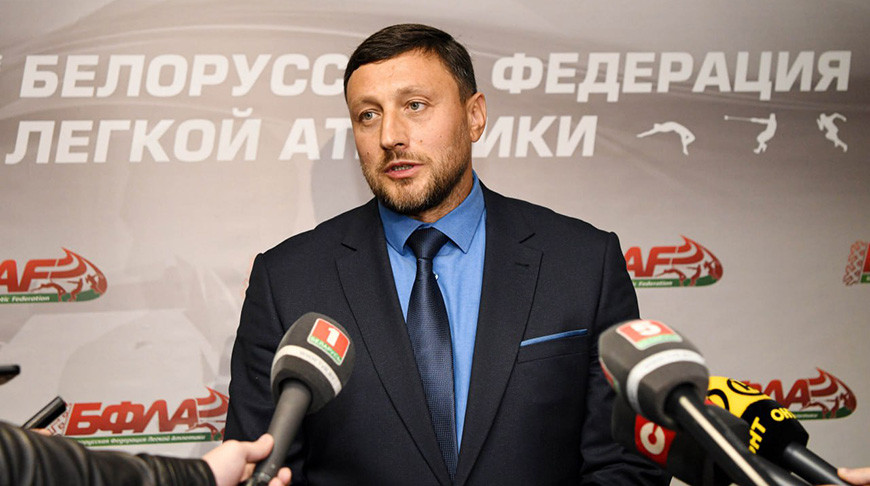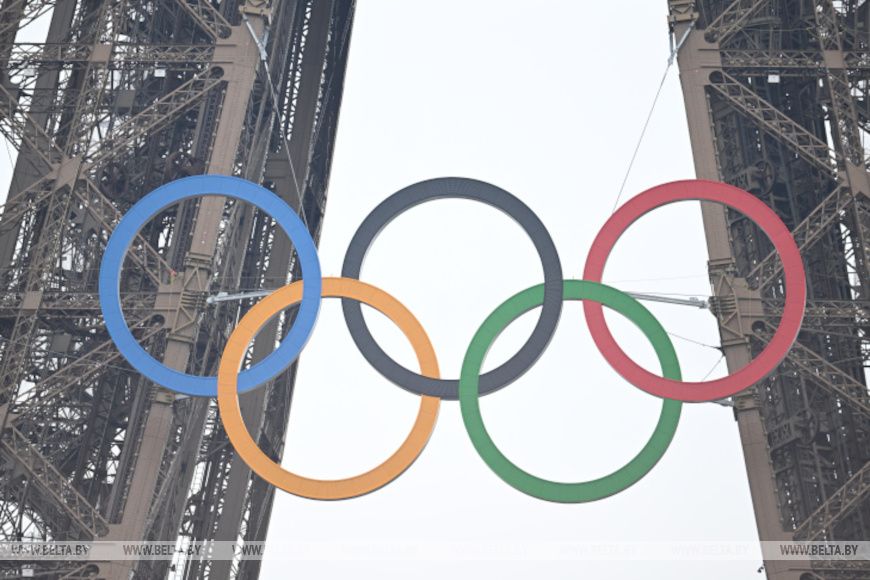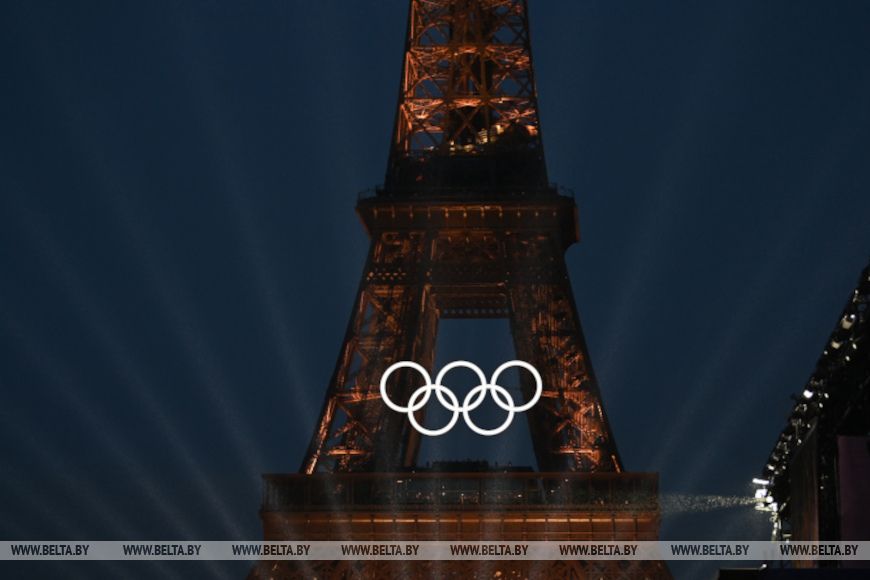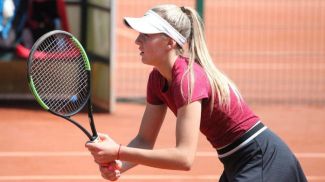
Belarusians are competing in the Olympic Games in Paris in a neutral status. We asked the two-time world champion and Olympic medalist, chairman of the Belarusian Athletics Federation Ivan Tsikhan how this can affect their results and what’s really going on behind the scenes of the Games.
Mr Tsikhan, from the day of the official opening, the Olympics in Paris have drawn a lot of crisis. They seem to be on the way to become the most disastrous in terms of organization: the scandal with the skit resembling Last Supper, the Olympic flag flown upside down near the Eiffel Tower, the Republic of Korea announced as the DPRK, the canceled triathlon training due to the poor quality of water in the Seine... This is not to mention the fact that athletes and spectators in Paris are robbed on the streets. A watch and jewelry worth half a million dollars were stolen from ex-CSKA coach Zico, 11 luxury bags were stolen from a sister-in-law of Qatar's Emir. In your opinion, what does this level of organization mean?
Regarding street robberies, there is nothing surprising to me here. Even a year before the Olympics, it was obvious that the French police could not cope with the large inflow of people. In 2023, there was a series of riots in Paris. We remember very well how protesters seized municipal buildings. The French police were unable to cope with the situation then and are unable to cope with it now. More than 10,000 athletes came to the Olympics, and it is hard to even imagine how many fans there are. It is not clear how to ensure their safety when the system is not organized accordingly. It is difficult to change something in a short period of time. It is a process that takes years. At the moment, the French do not have enough people or professionalism to cope with the situation on the streets of Paris.
As for the failures at the opening ceremony, there were many. And this raises concerns because this part of the Olympics is always prepared very thoroughly. All technical things - judges, competition venues, athletes' accommodation and many other things - are worked out by the federations way ahead. Therefore, there is plenty of time to rehearse the opening ceremony to perfection.
I will say this about The Last Supper skit: it does not fit into the framework of Christianity, basic civility, or common sense. The fact that the organizers allowed such a scene and it was approved by someone says the following: there are people in the governing body who lobby for the sexual minorities. This is also evident in the sporting component of the Olympics: we see more and more LGBTQ representatives among the participants.
To be honest, I don't understand how to compete with such athletes. There was, for example, 800m runner Caster Semenya, a two-time Olympic champion from South Africa. In 2016, she competed in the 800m against Belarusian Maryna Arzamasova. Some people thought Caster Semenya was a man because she lacked feminine features. The tests confirmed: the athlete has naturally elevated testosterone levels, i.e. she has a physical advantage over the others. Later on social media reported that Caster had married a girl. People do not hide these anymore.
In my opinion, it would be more appropriate to hold a separate event for such athletes. The Olympic Games were originally created with a different message, emphasizing traditional values.
It's a shame that many people will remember the Olympics in Paris for the Last Supper scandal, because there were some good moments in the opening ceremony, weren't there?
A good idea, for example, was to move everything from the stadium to the city center. No matter how roomy the sports facility is, the number of spectators is still limited, and many more were able to see the ceremony on the banks of the Seine. Probably, it was only the residents of houses in the center of Paris that were not happy about this: the organizers blocked the streets for transport and created a number of other inconveniences.
It's good that at least the Seine River was cleaned for the Olympics. However, the cause of its contamination has not been eliminated. Paris 2024 organizers allowed public to run the marathon course. How do you like this innovation? The mass start marathon will take place on the same day as the Olympic race and anyone can join. Does this lower the bar of the Olympics?
Paris 2024 organizers allowed public to run the marathon course. How do you like this innovation? The mass start marathon will take place on the same day as the Olympic race and anyone can join. Does this lower the bar of the Olympics?
I don't know what arguments they used when making such a decision. The Olympic Games have always been a purely professional event bringing together the best athletes in the world. What is the purpose of the amateur marathon at the Olympics? To popularize running sport? But it does not need it: a huge number of different marathons for amateurs are held around the world. The amateur running movement already has so many opportunities.
The Olympics are the pinnacle of world-class sport. If we put an amateur on a marathon distance, it would be disrespectful to professional athletes. Athletes devote their lives to getting a chance to compete at the Olympics! But it turns out that amateurs should only want to get there, pay for a slot and it is done. I believe this marathon has no place at the Olympics. It could have been held before or after the Games, but not as part of them.
No Belarusian track and field athlete has been allowed to compete at the Paris Olympics. Being the head of the Belarusian Athletics Federation, did your best to get them to the Games: you wrote letters, negotiated with international functionaries. Why do you think this did not work?
IAAF President Sebastian Coe took a very tough stance towards us. We held negotiations, video conferences via messenger. Coe was very optimistic, saying something in support, promising steps to develop athletics. I suggested we move from general words to a detailed discussion of the situation. I explained that we support and develop sports, too, and receive government backing on the matter. The entire athletics team works for results, but we need to understand what we are doing it for. We want to participate in the Olympics. But Coe said no.
Did that decision surprise you? In 1980 he himself had to perform under the flag of the Olympic Movement because of the boycott of the Games by the UK. He should understand the feelings of the Belarusian athletes more than anyone else.
You reason in a Slavic way, but Europeans are fundamentally different from us. They don't remember good things. If in 1980 in Moscow Coe had not been given the opportunity to perform under the flag of the Olympic movement, the silver medal in the 800m would have gone to the Soviet athlete Nikolai Kirov. By the way, he is our fellow countryman. He was born in Gomel Oblast. Nikolai Kirov had to settle for bronze then.
By the way, Coe attended a ceremony to open Dinamo Stadium in Minsk after reconstruction. He talked to the head of state and promised him a lot of things. But he never delivered... They say he has his eyes on the post of the IOC president and that’s why he seeks to score political points and probably that’s why he banned our athletes. I think Coe has forgotten that the IAAF head must represent the interests of athletics rather than lobby the interests of any party. We see that the principles of the Olympic Charter – peace, friendship and understanding - do not work in his case. Therefore, Coe's decision not to allow Belarusian track and field athletes to the Games, frankly speaking, did not surprise me at all. I was ready for such an outcome. I expected such a development, although until the last moment in all interviews I expressed hope that Belarusian track and field athletes would be allowed to the Olympics, even in a neutral status. I also told the athletes to be ready for any situation. I told them that if they were allowed to the Games, they should go and show their best. Although even then we already agreed with our athletes that the BRICS Games would be the main event of the year for us.
Sport in general is an intricate thing. It has become so especially in the past 10 years. Let us remember the “canoe team case”, the doping scandal in 2016. Back then the Belarusian men's team was banned from the Olympics after a police raid found 16 meldonium tablets in a room of the women's team coach. The proceedings lasted for a long time, and the guilt of our athletes was not proven. The whole situation however prevented them from winning at least three Olympic medals. In 2022, our track and field athletes Pavel Kryvitski, Alena Kiyevich and Nadzeya Astapchuk were disqualified for violating anti-doping rules. You yourself have been the victim of such a scandal more than once. Don’t you get an impression that doping is used a means of eliminating competitors today?
Yes, I do. Of course, it is impossible to prove it, but athletes see that the World Anti-Doping Agency has become a skillfully-used lever of control. Every country participating in the Olympic Games pours a lot of money into high-performance sports and wants its athlete to grace the podium and be the best. This is achieved, among other things, by behind-the-scenes games.
I will cite my example. In 2012, I went to the London Olympics as the season leader. By that time I had already competed at two Olympic Games and was at the peak of my athletic form. I believe that I was the best in my field then. However the day before the competition, I was informed about my suspension because of an allegedly positive test sample at the 2004 Olympics in Athens, where I won silver. I believe I was simply removed as the main competitor then, but of course it is impossible to prove anything. There was also an interesting story with Hungarian hammer thrower Adrian Annus. In 2004 in Athens, he took Olympic gold. Immediately, a document came from somewhere demanding to test Annus for doping. He refused to give a sample and, as it turned out, had already left the athletes' village. The result was the disqualification of the athlete, and the gold medal went to Koji Murofushi from Japan. By the way, Japan finances the International Olympic Committee.
Our athletes compete in Paris in a neutral status. In your opinion, does it affect their results?
The Olympic Games imply competition on equal terms. The neutral status initially puts the participant in unequal conditions. Firstly, it deprives the athlete of assistants: there is no representative, no doctor, no masseur. The athlete has to perform all their functions himself. Secondly, neutral status is a psychological pressure. Despite the fact that athletes are strong, including mentally, it is difficult to show maximum results under stress.
There are no trifles in the elite sport. An athlete gives about 15 years of his life, including four years of focused work to participate in the Olympics. Of course, he wants to perform at his best. Why do all athletes want to go to the Olympics so badly? Because there are the strongest competitors in the world. This energy of competition at the Games is so dense that you can almost feel it physically. In order to win, one of the almost equal competitors must have a lot of things matched.
But it is good that our athletes are competing at the Olympics, even in a neutral status. They show the level of sport in our country, . I cheer and worry for them. When I watch their performance, I always think only good things about them, send them positive vibes. I always hope that our guys can reveal their full potential and show a good result. Although I would not go to the Games in neutral status.
Why?
I am a team player. I can't imagine how it feels to go for years together with my colleagues and then take part in a competition in some obscure status alone. Only athletes could probably make me change my mind. If the team got together and decided: "Ivan Tsikhan must perform," I would have accepted it.
Do you follow the performances of Belarusians at the Olympics?
Of course! I've got a weekly schedule of our athletes' performances in my diary. I told my family: "Watch the Olympics. Even if there are no Belarusian athletes there, but our guys compete in other sports". After all, there are athletes there, with whom we will compete when the time comes. Before that, you need to study them. It helps to understand what you can oppose them, how to win.
For example, all my opponents were taller. I remember standing on the top step of the pedestal, and they, although in second and third place, were cut above me. I realize that the only way to beat them was to improve my technical performance. That's how I won.
Despite all the difficulties Team Belarus already won medals at the Olympics in Paris! Is it an expected result for you?
Ivan Litvinovich's gold - yes. I had no doubts about it. Ivan was going to the Games as a leader and an obvious medal hopeful. It was important that nothing hindered him.
We are very happy for our trampolinists Ivan Litvinovich and Viyaleta Bardzilouskaya. They showed high skill, professionalism, and the good traditions of the Belarusian trampoline school. Of course, we should pay tribute to Olga Vlasova, whose students have already conquered the Olympic podium for the third time in a row.
Yauheni Zalaty impressed us very much. It was a great performance. He showed character, will and determination! Behind these successes are also coaches who deserve respect and honor.
Do you think we will have more medals at this Olympics?
I expect Yauheni Tsikhantsou to do well in weightlifting. He already has experience in the Olympics, it should help him to show good results. It's just a pity that even when Belarusians win medals at the Olympic Games in Paris, our flag is not raised and the anthem is not played. Every athlete must have the right to compete under the national flag, no matter what.
Mr Tsikhan, from the day of the official opening, the Olympics in Paris have drawn a lot of crisis. They seem to be on the way to become the most disastrous in terms of organization: the scandal with the skit resembling Last Supper, the Olympic flag flown upside down near the Eiffel Tower, the Republic of Korea announced as the DPRK, the canceled triathlon training due to the poor quality of water in the Seine... This is not to mention the fact that athletes and spectators in Paris are robbed on the streets. A watch and jewelry worth half a million dollars were stolen from ex-CSKA coach Zico, 11 luxury bags were stolen from a sister-in-law of Qatar's Emir. In your opinion, what does this level of organization mean?
Regarding street robberies, there is nothing surprising to me here. Even a year before the Olympics, it was obvious that the French police could not cope with the large inflow of people. In 2023, there was a series of riots in Paris. We remember very well how protesters seized municipal buildings. The French police were unable to cope with the situation then and are unable to cope with it now. More than 10,000 athletes came to the Olympics, and it is hard to even imagine how many fans there are. It is not clear how to ensure their safety when the system is not organized accordingly. It is difficult to change something in a short period of time. It is a process that takes years. At the moment, the French do not have enough people or professionalism to cope with the situation on the streets of Paris.
As for the failures at the opening ceremony, there were many. And this raises concerns because this part of the Olympics is always prepared very thoroughly. All technical things - judges, competition venues, athletes' accommodation and many other things - are worked out by the federations way ahead. Therefore, there is plenty of time to rehearse the opening ceremony to perfection.
I will say this about The Last Supper skit: it does not fit into the framework of Christianity, basic civility, or common sense. The fact that the organizers allowed such a scene and it was approved by someone says the following: there are people in the governing body who lobby for the sexual minorities. This is also evident in the sporting component of the Olympics: we see more and more LGBTQ representatives among the participants.
To be honest, I don't understand how to compete with such athletes. There was, for example, 800m runner Caster Semenya, a two-time Olympic champion from South Africa. In 2016, she competed in the 800m against Belarusian Maryna Arzamasova. Some people thought Caster Semenya was a man because she lacked feminine features. The tests confirmed: the athlete has naturally elevated testosterone levels, i.e. she has a physical advantage over the others. Later on social media reported that Caster had married a girl. People do not hide these anymore.
In my opinion, it would be more appropriate to hold a separate event for such athletes. The Olympic Games were originally created with a different message, emphasizing traditional values.
It's a shame that many people will remember the Olympics in Paris for the Last Supper scandal, because there were some good moments in the opening ceremony, weren't there?
A good idea, for example, was to move everything from the stadium to the city center. No matter how roomy the sports facility is, the number of spectators is still limited, and many more were able to see the ceremony on the banks of the Seine. Probably, it was only the residents of houses in the center of Paris that were not happy about this: the organizers blocked the streets for transport and created a number of other inconveniences.
It's good that at least the Seine River was cleaned for the Olympics. However, the cause of its contamination has not been eliminated.
 Paris 2024 organizers allowed public to run the marathon course. How do you like this innovation? The mass start marathon will take place on the same day as the Olympic race and anyone can join. Does this lower the bar of the Olympics?
Paris 2024 organizers allowed public to run the marathon course. How do you like this innovation? The mass start marathon will take place on the same day as the Olympic race and anyone can join. Does this lower the bar of the Olympics?
I don't know what arguments they used when making such a decision. The Olympic Games have always been a purely professional event bringing together the best athletes in the world. What is the purpose of the amateur marathon at the Olympics? To popularize running sport? But it does not need it: a huge number of different marathons for amateurs are held around the world. The amateur running movement already has so many opportunities.
The Olympics are the pinnacle of world-class sport. If we put an amateur on a marathon distance, it would be disrespectful to professional athletes. Athletes devote their lives to getting a chance to compete at the Olympics! But it turns out that amateurs should only want to get there, pay for a slot and it is done. I believe this marathon has no place at the Olympics. It could have been held before or after the Games, but not as part of them.
No Belarusian track and field athlete has been allowed to compete at the Paris Olympics. Being the head of the Belarusian Athletics Federation, did your best to get them to the Games: you wrote letters, negotiated with international functionaries. Why do you think this did not work?
IAAF President Sebastian Coe took a very tough stance towards us. We held negotiations, video conferences via messenger. Coe was very optimistic, saying something in support, promising steps to develop athletics. I suggested we move from general words to a detailed discussion of the situation. I explained that we support and develop sports, too, and receive government backing on the matter. The entire athletics team works for results, but we need to understand what we are doing it for. We want to participate in the Olympics. But Coe said no.
Did that decision surprise you? In 1980 he himself had to perform under the flag of the Olympic Movement because of the boycott of the Games by the UK. He should understand the feelings of the Belarusian athletes more than anyone else.
You reason in a Slavic way, but Europeans are fundamentally different from us. They don't remember good things. If in 1980 in Moscow Coe had not been given the opportunity to perform under the flag of the Olympic movement, the silver medal in the 800m would have gone to the Soviet athlete Nikolai Kirov. By the way, he is our fellow countryman. He was born in Gomel Oblast. Nikolai Kirov had to settle for bronze then.
By the way, Coe attended a ceremony to open Dinamo Stadium in Minsk after reconstruction. He talked to the head of state and promised him a lot of things. But he never delivered... They say he has his eyes on the post of the IOC president and that’s why he seeks to score political points and probably that’s why he banned our athletes. I think Coe has forgotten that the IAAF head must represent the interests of athletics rather than lobby the interests of any party. We see that the principles of the Olympic Charter – peace, friendship and understanding - do not work in his case. Therefore, Coe's decision not to allow Belarusian track and field athletes to the Games, frankly speaking, did not surprise me at all. I was ready for such an outcome. I expected such a development, although until the last moment in all interviews I expressed hope that Belarusian track and field athletes would be allowed to the Olympics, even in a neutral status. I also told the athletes to be ready for any situation. I told them that if they were allowed to the Games, they should go and show their best. Although even then we already agreed with our athletes that the BRICS Games would be the main event of the year for us.

Sport in general is an intricate thing. It has become so especially in the past 10 years. Let us remember the “canoe team case”, the doping scandal in 2016. Back then the Belarusian men's team was banned from the Olympics after a police raid found 16 meldonium tablets in a room of the women's team coach. The proceedings lasted for a long time, and the guilt of our athletes was not proven. The whole situation however prevented them from winning at least three Olympic medals. In 2022, our track and field athletes Pavel Kryvitski, Alena Kiyevich and Nadzeya Astapchuk were disqualified for violating anti-doping rules. You yourself have been the victim of such a scandal more than once. Don’t you get an impression that doping is used a means of eliminating competitors today?
Yes, I do. Of course, it is impossible to prove it, but athletes see that the World Anti-Doping Agency has become a skillfully-used lever of control. Every country participating in the Olympic Games pours a lot of money into high-performance sports and wants its athlete to grace the podium and be the best. This is achieved, among other things, by behind-the-scenes games.
I will cite my example. In 2012, I went to the London Olympics as the season leader. By that time I had already competed at two Olympic Games and was at the peak of my athletic form. I believe that I was the best in my field then. However the day before the competition, I was informed about my suspension because of an allegedly positive test sample at the 2004 Olympics in Athens, where I won silver. I believe I was simply removed as the main competitor then, but of course it is impossible to prove anything. There was also an interesting story with Hungarian hammer thrower Adrian Annus. In 2004 in Athens, he took Olympic gold. Immediately, a document came from somewhere demanding to test Annus for doping. He refused to give a sample and, as it turned out, had already left the athletes' village. The result was the disqualification of the athlete, and the gold medal went to Koji Murofushi from Japan. By the way, Japan finances the International Olympic Committee.
Our athletes compete in Paris in a neutral status. In your opinion, does it affect their results?
The Olympic Games imply competition on equal terms. The neutral status initially puts the participant in unequal conditions. Firstly, it deprives the athlete of assistants: there is no representative, no doctor, no masseur. The athlete has to perform all their functions himself. Secondly, neutral status is a psychological pressure. Despite the fact that athletes are strong, including mentally, it is difficult to show maximum results under stress.
There are no trifles in the elite sport. An athlete gives about 15 years of his life, including four years of focused work to participate in the Olympics. Of course, he wants to perform at his best. Why do all athletes want to go to the Olympics so badly? Because there are the strongest competitors in the world. This energy of competition at the Games is so dense that you can almost feel it physically. In order to win, one of the almost equal competitors must have a lot of things matched.
But it is good that our athletes are competing at the Olympics, even in a neutral status. They show the level of sport in our country, . I cheer and worry for them. When I watch their performance, I always think only good things about them, send them positive vibes. I always hope that our guys can reveal their full potential and show a good result. Although I would not go to the Games in neutral status.
Why?
I am a team player. I can't imagine how it feels to go for years together with my colleagues and then take part in a competition in some obscure status alone. Only athletes could probably make me change my mind. If the team got together and decided: "Ivan Tsikhan must perform," I would have accepted it.
Do you follow the performances of Belarusians at the Olympics?
Of course! I've got a weekly schedule of our athletes' performances in my diary. I told my family: "Watch the Olympics. Even if there are no Belarusian athletes there, but our guys compete in other sports". After all, there are athletes there, with whom we will compete when the time comes. Before that, you need to study them. It helps to understand what you can oppose them, how to win.
For example, all my opponents were taller. I remember standing on the top step of the pedestal, and they, although in second and third place, were cut above me. I realize that the only way to beat them was to improve my technical performance. That's how I won.
Despite all the difficulties Team Belarus already won medals at the Olympics in Paris! Is it an expected result for you?
Ivan Litvinovich's gold - yes. I had no doubts about it. Ivan was going to the Games as a leader and an obvious medal hopeful. It was important that nothing hindered him.
We are very happy for our trampolinists Ivan Litvinovich and Viyaleta Bardzilouskaya. They showed high skill, professionalism, and the good traditions of the Belarusian trampoline school. Of course, we should pay tribute to Olga Vlasova, whose students have already conquered the Olympic podium for the third time in a row.
Yauheni Zalaty impressed us very much. It was a great performance. He showed character, will and determination! Behind these successes are also coaches who deserve respect and honor.
Do you think we will have more medals at this Olympics?
I expect Yauheni Tsikhantsou to do well in weightlifting. He already has experience in the Olympics, it should help him to show good results. It's just a pity that even when Belarusians win medals at the Olympic Games in Paris, our flag is not raised and the anthem is not played. Every athlete must have the right to compete under the national flag, no matter what.













